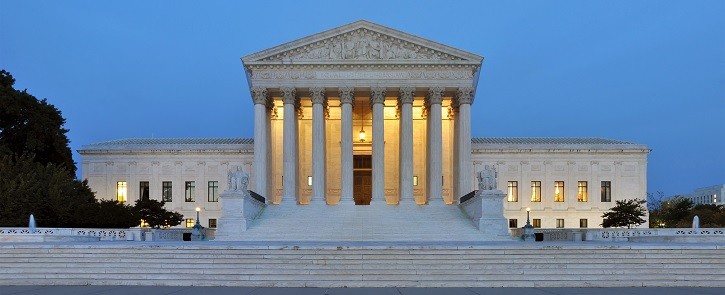

FOIA Goes to the Supreme Court


The Freedom of Information Act is headed to the Supreme Court. FOIA is a critical tool in the fight to make government more transparent and accountable. In 2017, the federal government fielded more than 800,000 FOIA requests. Many were shot down immediately as falling under one or more of the nine categories that Congress exempted from disclosure under FOIA, including broad swathes of information related to national security, law enforcement, personal privacy, privileged communications, and confidential commercial or financial information. A good overview of FOIA exemptions can be found here.
The new case on the Supreme Court docket, Food Marketing Institute v. Argus Leader Media, is focused on FOIA’s Exemption 4, trade secrets and commercial information. The exemption protects “trade secrets and commercial or financial information obtained from a person and that is privileged or confidential.”
Want to know how a federal contractor is making use of your tax dollars? Interested in the activities of a federally regulated financial entity? You’re in Exemption 4 territory.
Our FOIA friends at MuckRock note that the upcoming case could “either cement the public’s right to know or severely restrict the ability to track the flow of tax dollars into private companies.”
The case began in 2011 when the Sioux Falls Argus Leader decided to take a look at where food stamp money is spent. The newspaper filed a FOIA request with the U.S. Department of Agriculture, which administers the program, these days referred to as SNAP, the Supplemental Nutrition Assistance Program. The Argus Leader asked the USDA for the name, address, store type and annual SNAP sales figures for every participating store from 2005 to 2010.
The public has “a right to know how much taxpayer money grocers, gas stations, big box retailers and others get by participating in the federal food stamp program,” the newspaper has written.
“SNAP is a humongous program,” the newspaper noted in a supporting document filed later in the case. It provides more than 40 million Americans with average monthly food assistance of about $125, a $70 billion annual total. SNAP recipients use an official SNAP debit card for purchases.
The taxpayer stake in SNAP is clear. “Under SNAP,” the Argus Leader noted, “the money flows from the taxpayer to the government to the eligible SNAP households to the SNAP retailers from whom the food is purchased. The crux of the government program is that the government–with taxpayer dollars–buys groceries for low-income families from stores that wish to do business under the program.”
Enter Exemption 4. Responding to the Argus Leader FOIA, the Agriculture Department released names, store type and addresses, but declined to produce the yearly sales figures. The department argued the sales figures were exempt from disclosure because they constituted confidential business information.
The newspaper appealed the decision, the USDA ignored the appeal–typical FOIA behavior from the feds, alas–and the Argus Leader sued.
You can read the sad timeline of the case here. After a district court judge sided with the newspaper’s argument that disclosure of the sales figures would not cause substantial competitive harm to retailers, the USDA threw in the towel, agreeing to disclose the numbers.
That’s when food industry lobbyists stepped in. The Food Marketing Institute filed an emergency motion with the Eighth Circuit Court of Appeals to intervene. An Eighth Circuit panel heard the case and it too ruled in favor of the newspaper.
The wheels of FOIA turn slow. Seven years had passed since the Argus Leader’s original FOIA request. You can see the game here: run out the clock, grind down the requester.
But the lawyers were not done. After failing to get the entire Eighth Circuit to take up the matter, FMI filed a writ of certiorari with the Supreme Court, asking it to review the case.
The High Court accepted the case. It’s on the docket for April.
Scotusblog notes that the Supremes are likely looking to “resolve at least five circuit [court] splits over Exemption 4’s “confidentiality” term and whether the “substantial-competitive-harm” claim test is satisfied.
MuckRock warns that if the lower-court decisions “are overturned, lack of access to this data will continue to hold back public spending accountability and nutrition research around the country–and provide corporations a powerful tool to keep public data proprietary in other cases.”
***
Judicial Watch is the nation’s leading litigator of FOIA actions.
Micah Morrison is chief investigative reporter for Judicial Watch. Follow him on Twitter @micah_morrison. Tips: [email protected]
Investigative Bulletin is published by Judicial Watch. Reprints and media inquiries: [email protected]















